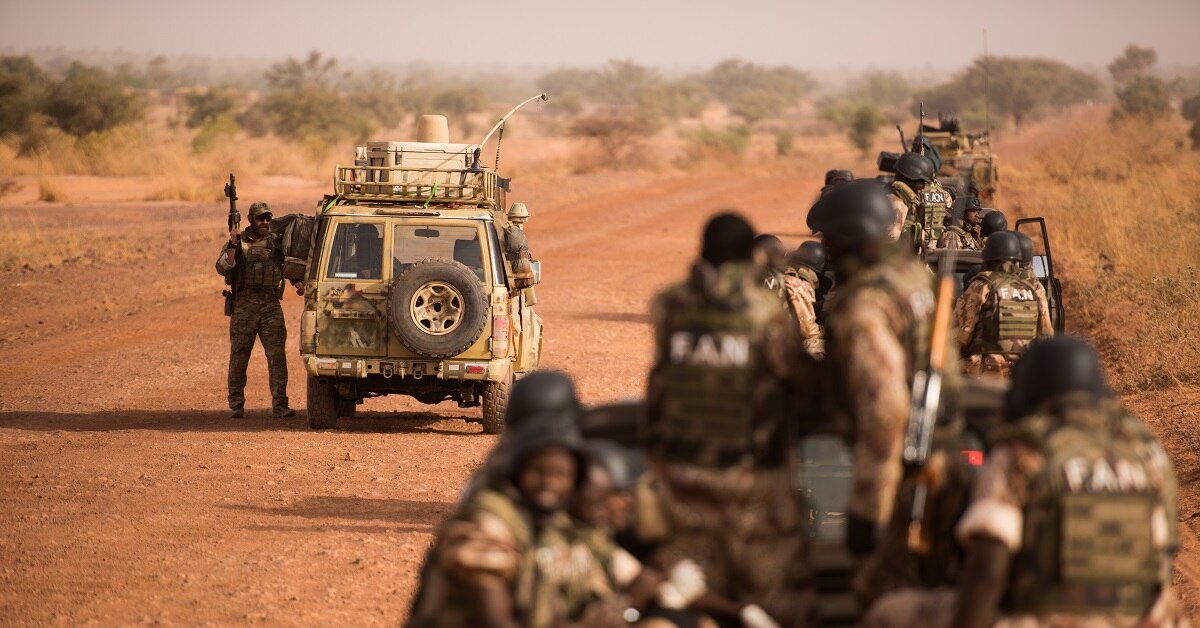With Limited Resources, US Military Shifts Strategy From Degrading Militants in West Africa to Containment
Violence by militant groups in West Africa has spiked 250 percent over the last two years but constrained resources and manpower has pushed the U.S. military to switch strategies from degrading terror groups to containment, according to a recent inspector general report.
Resources for the thinly spread American troops across U.S. Africa Command may be further constrained should the Pentagon decide to curtail the counterterror mission in the region following a defense-wide posture review that is still pending.
Secretary of Defense Mark Esper told reporters in January that U.S. troops were not withdrawing from AFRICOM entirely, but he suggested the U.S. might pull back on the counterterror mission in Africa to address great power competition, namely Russia and China.
/arc-anglerfish-arc2-prod-mco.s3.amazonaws.com/public/TA6DZEQLS5FMXOGUCU634UYRAE.jpg)
“But I had the opportunity to tell, again, to mention again that the U.S. support is critical to our operations and that its reduction would severely limit our effectiveness against terrorists.”Shawn SnowandDiana Stancy Correll
The IG report detailed that violent militants have killed nearly 230 soldiers in Niger, Burkina Faso, and Mali in a “targeted terrorist campaign” over the last several months. Officials with AFRICOM warned that if the militants were not contained they “have the potential to spread through the region and impact Western interests.”
Degrading terror groups in the region is a complicated task that requires a sustained counterterror operations and an “ongoing commitment” of U.S. military resources to the fight, the IG report said.
AFRICOM said in the IG report that degrading a violent militant group means the organization can no longer project power and that its command and control is disrupted.
“However, the challenge inherent to the “degrade” strategy is that many partner forces in Africa will likely require assistance and advising for a long period of time before they can fully address VEO [violent extremist organization] threats on their own. In addition, terrorist threats in Africa are numerous and dynamic, often requiring U.S. forces and their allies to step in and execute immediate responses to threats across an expansive geography,” the report reads.
AFRICOM told the IG that there is a resource competition that poses a challenge across the command.
“These limited resources include personnel services to support those personnel (including medical evacuation), and intelligence, surveillance, and reconnaissance assets,” the report reads.
/arc-anglerfish-arc2-prod-mco.s3.amazonaws.com/public/4H5Z3NVFERCKTJ4WELDEEFMLHI.jpg)
The remotely piloted aircraft may have been brought down by Russian mercenaries or troops with Khalifa Hifter’s Libyan National Army operating a Russian air defense system.Shawn Snow
In West Africa, U.S. forces conduct advise and assist missions and sometimes accompany partner forces on operations. U.S. air assets also provide intelligence collection. But the bulk of the fighting is conducted by nearly 4,000 French troops helping combat militant groups as part of Operation Barkhane.
French Minister of Armed Forces Florence Parly told reporters during a joint press briefing at the Pentagon in January, that U.S. assistance in West Africa and the Sahel was critical.
“We actually thank the United States for all the support it has been providing to our operations for the past seven years,” Parly said Monday.
“But I had the opportunity to tell, again, to mention again that the U.S. support is critical to our operations and that its reduction would severely limit our effectiveness against terrorists,” she said.
There are roughly 800 U.S. troops in West Africa, according to the IG report.



